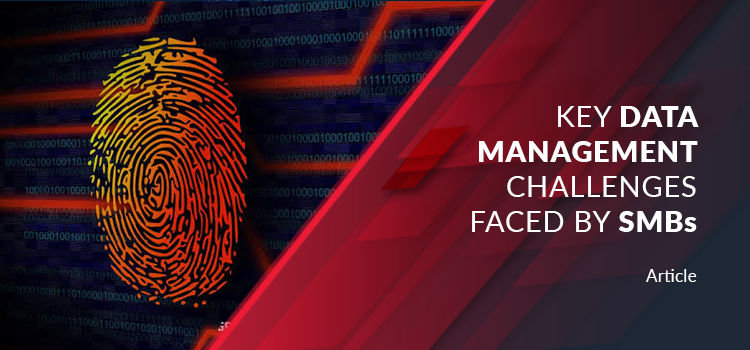In today’s world, good data management has become something of a sound foundation underpinning all of the processes, an obvious requirement for today’s SMB’s, which is much harder achieved than preached.
Who would not want his business insights to be data-driven, at the same time, the majority of them are not able to realise this goal? The reason being that data management like always in the past still continues to be fragmented and driven with multiple goals and that too by multiple stakeholders. The end result is nothing but the deliverance of a high degree of inaccuracy stemming out from an organisation dealing with its share of highly inaccurate and data arriving in various forms and formats.
Data management or more recently christened as Big Data Analytics (its more inclusive and current version, as is being popularised today) is more than just a top buzzword in the business scenario of 2019.SMBs are also queuing up to reap the benefits but are being faced with key data management challenges from the point start.
Why?
- The Mammoth Size
Essentially because a lot many of the smaller companies feel that there are just too many hurdles when it comes to managing their data well. As quoted by Sebastien Boyer, last year, 16.1 billion zettabytes (one ZB = trillion gigabytes) of data was generated on a daily basis. While that number is certainly remarkable, by 2025, that number is expected to increase to 163 ZB every single day. Due to the sheer volume and complexity, many find it extremely daunting to even just find out what exactly certain datasets mean and how they can apply them to usher in a new era of development within their organizations.
- Tardy Performance
The data got from prehistoric systems is a main problem for the SMBs. The snail’s pace access to data and time guzzling queries generated by these older systems becomes a sore in the eye for all SMBs.
If somehow due operational constraints, organisations rarely have the required time to gather all the data, then there is a risk of circulating incomplete data. On the other hand, the highest unit of data measure has reached up to Yottabyte, and with the absence of tools or ways to mine such quantum of data in moments, there is no stopping any losses from being incurred in such a scenario, irrevocably.
- Lack of specialized/trained staff
The deficiency of IT-specialized staff in a lot of sectors and within many SMBs face this difficulty too as building a data warehouse becomes quite a task. Procuring, organising, and handling the software, hardware, and databases is a giant task for even the most seasoned in the field. Without proper human assets, organisations land up wasting time and money in fine-tuning the systems. Those SMBs reach their data management goals that reduce the gap between procurement and production.
- Low-cost state-of-the-art infrastructure-Better said than done.
Creating the space, its design, power, and cooling at a competitive price at a data centre remains a big challenge to be mitigated even today after so many years of the I.T boom making it a primary challenge for SMBs to leverage the available assets for making a data centre. Also, the green data centre is the necessity in today’s era because the emitting the lowest possible amount of carbon footprint is the objective to be encrypted in the minds of the designers.
- Multiple Team Coordination
Data management is that it is not limited to any single branch in today’s business scenario. It can assist marketing teams to create better strategies, accounting departments budget more efficiently, and make sure IT departments effectively have the best information at their fingertips.
One of the biggest challenges that businesses face is coordinating all this type of technology pan various departments. Project management involving a good amount of data management requires their management to manage all the multiple cross-functional teams and departments. The responsibility of the same rest on the shoulders of all the project leaders to ensure its execution.
- Reacting when one should respond
Ironically one of the biggest problems witnessed in the data management conducted at SMB’s, is that these SMB’s more often than not refuse to take notice of a problem with their data. This means many organisations take to a much more reactive approach to the various aspects of data management, and will often gestate till they find specific issues that require their attention when in reality one does not have to wait for the rains to build dams.
- Upbeat and Tapping New Trends
The field of data management is ever-evolving, growing, and causing many SMB’s to think whether or not they can keep up with latest developments rushing into the markets. As more SMB’s are warming up to increase the scope of data management by beginning to rely on its insights while taking strategically important calls for the organisation, industries are predicting a major shortage of workers in the coming years ,as fewer workers will be available to fill into the shoes of necessary roles for proper data analytics. And any aspirations to becoming a data-driven organization would require teams to stay abreast on the latest developments taking place in the market place on a daily basis, considering the dynamism of the field of analytics.
Data management –Bane or a boon.
As organisations begin their metamorphosis into a more data-centric organisation, the importance of quality data and having a more sophisticated approach to managing data cannot be emphasised enough here. From creating value addition in the current customer relationships to overcoming internal and external data management obstacles in the daily running of operations, organisations will need to completely change their old ways of handling data to creating a much more evolved data management practice much in tune with the times of now. The ability to use high-quality data to make strategically valuable business decisions and improve your bottom line should be the focal point in the times to come.











